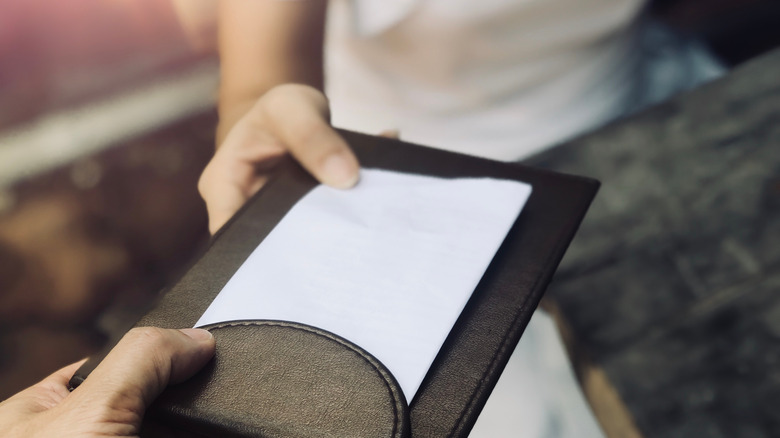Are There Etiquette Rules To Determine Who Pays For Dinner?
Dining out is an occasion. It's a chance to take a break from cooking and enjoy a delicious meal without having to worry about doing the dishes afterwards. It allows us to soak in the ambiance of a different space, and more importantly, it lets us socialize with others. Don't get us wrong, dining solo does have its advantages, but dining in company is often more pleasurable. In fact, University of Oxford recently found that communal eating strengthens bonding, which can boost wellbeing and elevate a sense of belonging. However, there is one headache that comes along with dining with others: The after dinner debacle of who is expected to pay.
All across the globe, there are different customs as to who should pay when you dine out. For example, splitting the bill is common practice in places like the UK or Norway, whereas in other countries like Vietnam or Iran, traditionally the host pays for dinner, explains Matador Network. That said, who pays the bill might even depend on whether you're dining with someone older, in the case of Korean or Thai cultures.
But, when it comes to who should pay in North America, we're here to help you demystify things.
The host should pay, never the guest
We're all familiar with the basic etiquette of dining out: Don't speak with a full mouth, keep phones off the table, use your napkin. However, one of the most overlooked items of etiquette actually happens once the meal is over and it's time to settle the bill. Does the onus fall on the host, guest, or is splitting the check acceptable?
Some suggest that determining who should pay depends on the occasion and your relationship to others. Though this may hold true for an informal dinner, generally the steadfast rule when it comes to who picks up the bill is that it should be the host. According to Style for Success, the person who initiates the dinner plans (the host) is responsible for paying.
That said, a way to avoid a tug-of-war over who pays the bill — should your guest be unaware that you're treating — is to arrange a payment plan beforehand. Calling the restaurant prior to the meal, or giving your credit card to the maître d' upon arrival is a great way to prevent any confusion, explains Business Insider. But, if you've missed your window of opportunity, the other option is to excuse yourself to use the restroom during the meal, and then notify your server that you'll be paying the bill.
Consider your dining conundrum solved!

